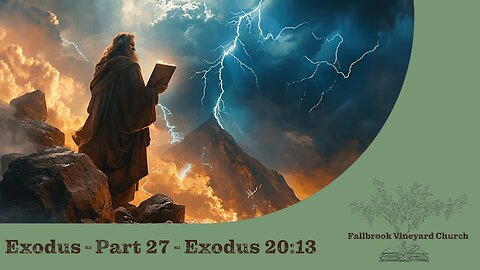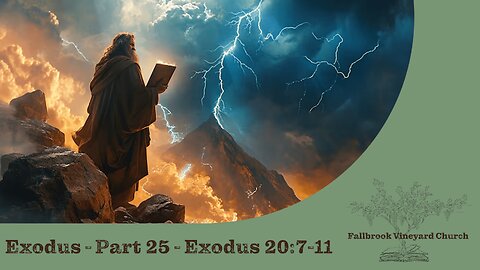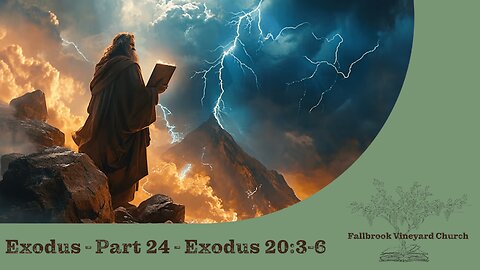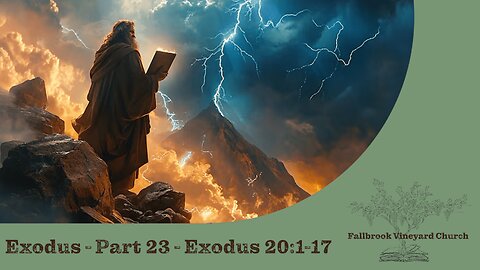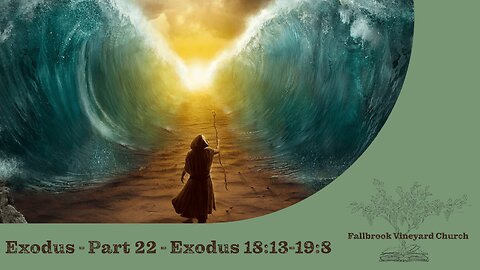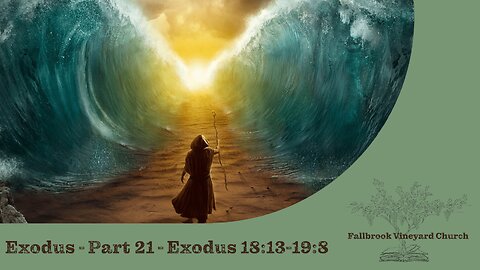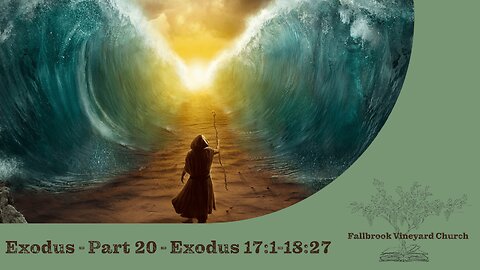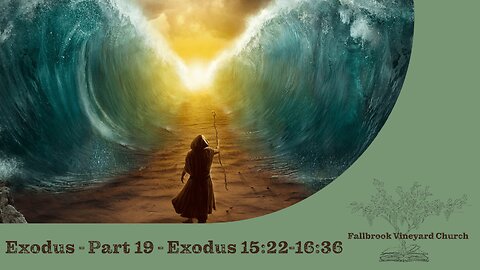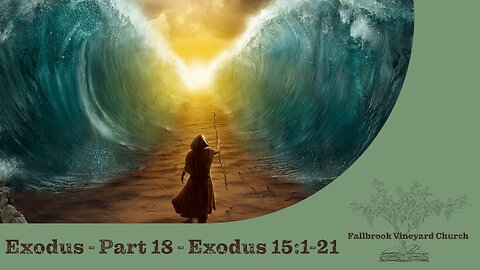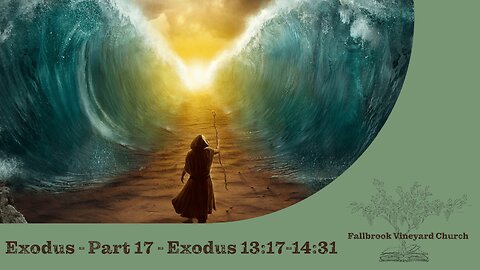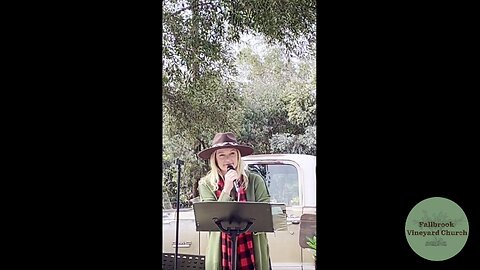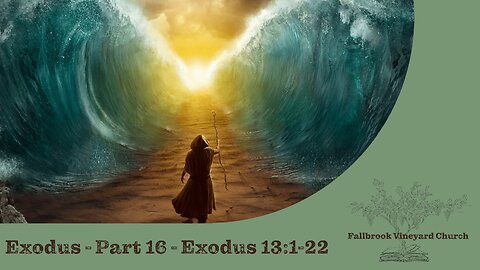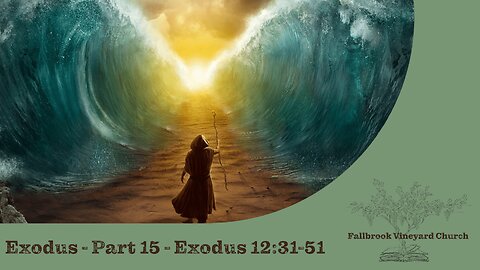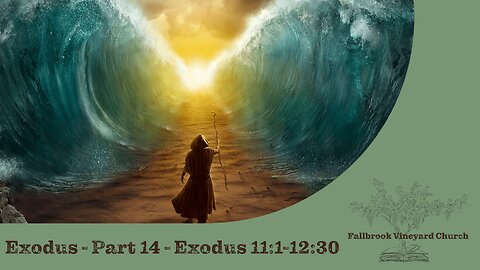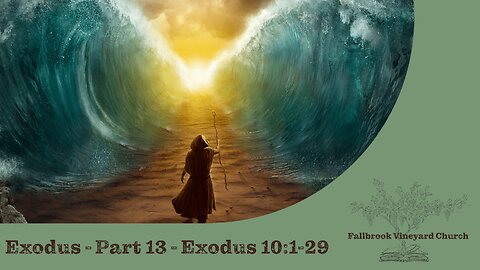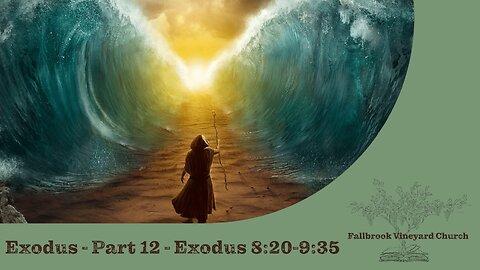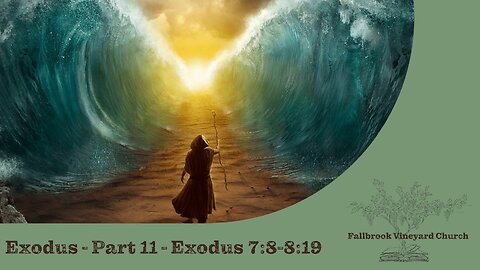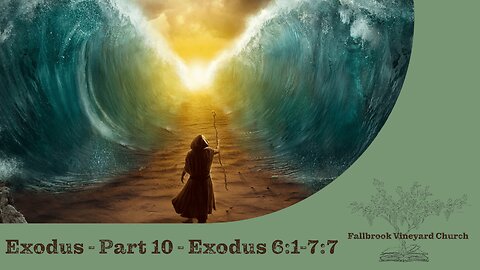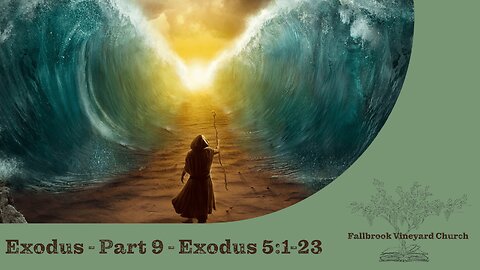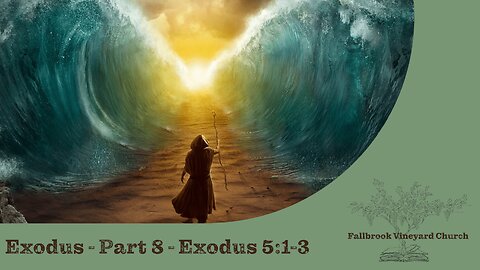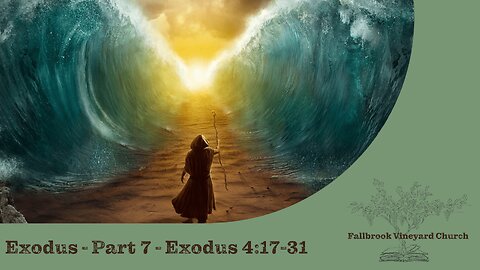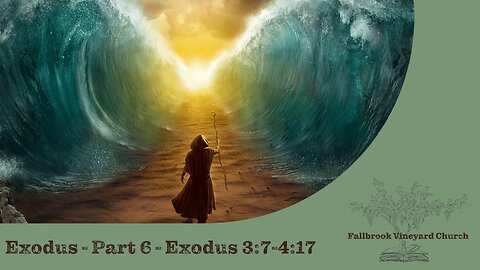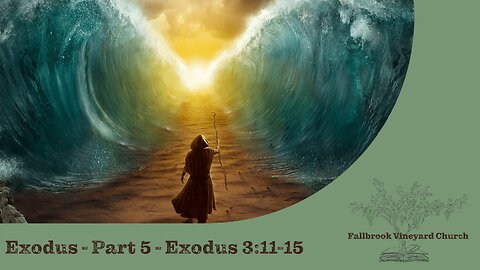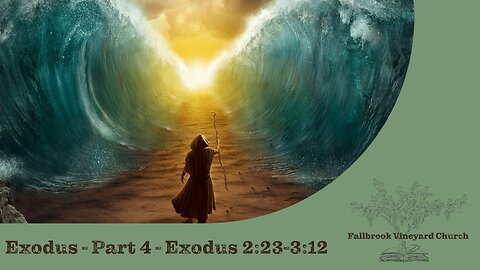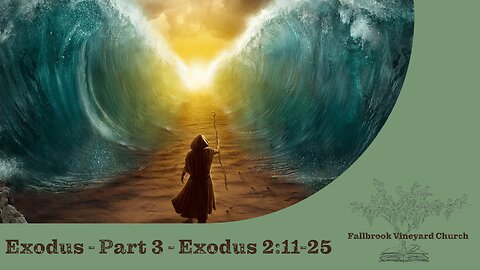Premium Only Content
This video is only available to Rumble Premium subscribers. Subscribe to
enjoy exclusive content and ad-free viewing.
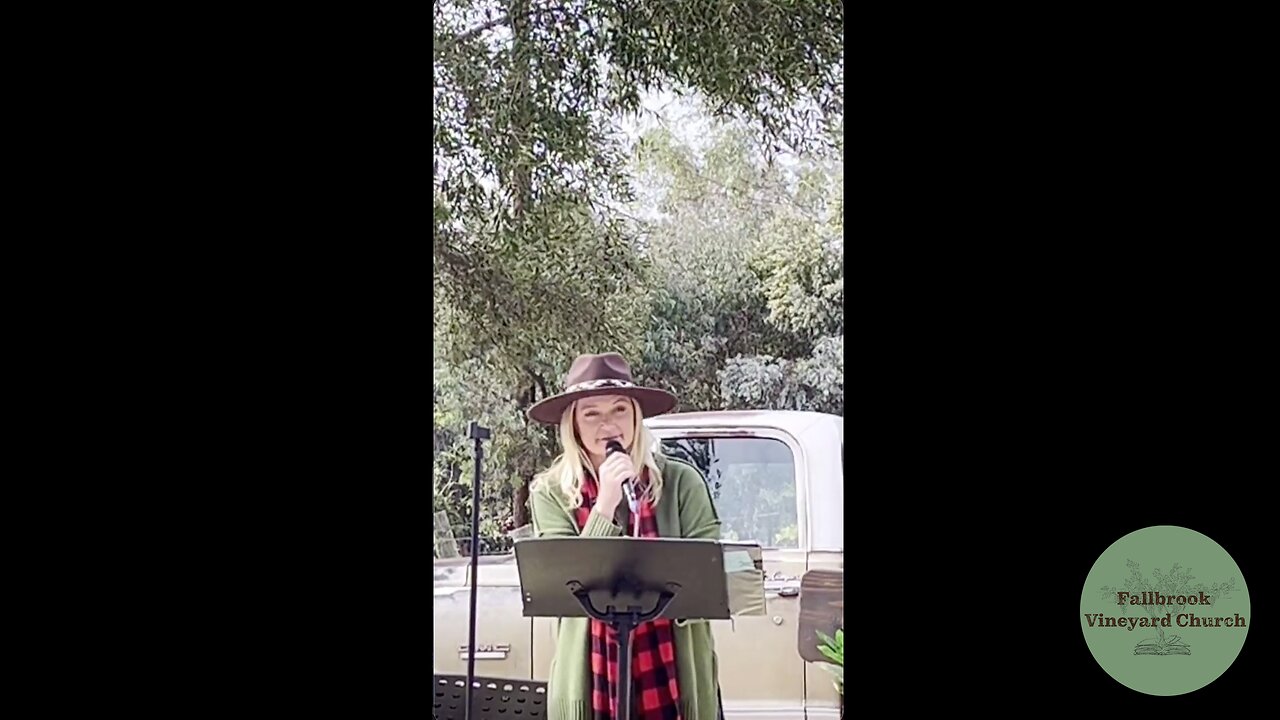
Exodus
FallbrookVineyardChurch
- 11 / 27
1
Exodus - Part 27 - Exodus 20:13
Fallbrook Vineyard Church
0:00 Intro
2:26 Joke
3:53 Worship
9:50 Announcements
12:23 Pledge of Allegiance
15:13 Worship Continued
31:27 Message
47:34 Hope Clinic For Women
1:00:17 Birth Choice
1:11:29 Closing Worship
The sixth commandment is “You shall not murder”. This commandment is pretty straightforward, but it has all sorts of implications for modern culture. Note, it doesn’t say “You shall not kill.” There are times when it is justified to take another life, such as in the case of self-defense. But murder is the intentional, malicious taking of an innocent human life.
The sixth commandment is a commandment to honor life. When the commandment was given, human sacrifice was a common practice. There were also brutal forms of slavery, and there was little regard for life in general. God was re-establishing the sanctity of human life with His people.
Murder is an attack on the opportunity to be in a relationship with God and with other people. God wants to be connected with us from womb to tomb. Only God has the authority to determine when our lives end. Life is sacred because we are made in the image of God. Even before we are born, God knows us, and He forms us in our mother’s womb.
At the point of conception, life is literally sparked. Science has observed a phenomenon of fluorescence at conception. It is a spark of light created when a sperm cell successfully fertilizes an egg. This scientific observation connects with what is written in John 1. The true Light, Jesus, gives light to every human coming into the world. Light happens when life happens.
Today, we have things like assisted suicide, abortion, and incubation, where babies are basically grown for organ transplants. All of these things are done in the name of compassion or in the name of saving more lives. But what this really is, is man trying to be God. God is God, and we are not. It breaks God’s heart to see life attacked in these ways.
2
Exodus - Part 25 - Exodus 20:7-11
Fallbrook Vineyard Church
0:00 Intro
0:49 Joke
2:03 Worship
5:16 Announcements
9:40 Pledge of Allegiance
12:03 Worship Continued
27:38 Rejoice, Watch, Pray
36:06 Message
1:07:46 Closing Worship
The next commandments we’ll explore in our deep dive are commandments 3 and 4. You shall not take the name of the Lord your God in vain. Remember the Sabbath day and keep it holy. So let’s break down what those mean.
You shall not take the name of the Lord your God in vain. This one is harder than it sounds. The word “vain” in Hebrew means emptiness, falseness, worthlessness, lying, or deceit. The name of God is not to be used in any of these senses of the word. The name of God is powerful and deserves respect.
It has the power of salvation according to Acts 4:12. It is a refuge according to Proverbs 18:10. His name is everlasting according to Revelation 1:8. His name holds authority according to Philippians 2:10-11. His name is glorified according to Isaiah 42:8. His name is powerful according to Proverbs 30:4.
If we don’t honor the name of God as Christians, how can we expect others to do the same? In our culture today, the name of God is thrown around carelessly as an exclamation of anger or frustration. It is used in a false oath or promise when we say “I swear to God.” It is used in a way that dishonors and trivializes Him. As our relationship and faith in Christ grows, we should find ourselves doing less of this. We need to exercise thoughtfulness in our daily lives.
Moving on to the next commandment. Remember the Sabbath day and keep it holy. Sabbath means rest. According to Genesis, God made everything in the world in six day and then rested on the seventh day. God wasn’t tired, but He wanted to establish the idea of taking a break from working. It has spiritual and practical applications.
It was God’s idea to take a break to enjoy the fruits of our labor with the people around us. In essence, God established the weekend. In ancient days, people worked from sunup to sundown. Rest was essential for physical refreshment for both man and animal. Rested people are more productive and healthy. They thrive, they are discerning, and they are more successful.
On a spiritual level, the Sabbath is a time to rest from normal everyday things and focus on God. Today our rest as believers is in Jesus Christ, which means we can rest in His peace and comfort every day. When we come to Him, He gives us rest from our burdens. The Law was given to show people what righteousness looks like, but only Jesus Christ can truly give it to us.
1
comment
3
Exodus - Part 24 - Exodus 20:3-6
Fallbrook Vineyard Church
We are beginning our deep dive into the Ten Commandments exploring exactly what they meant then and what they mean now. The first three have to do with who God is, how we are to worship God, and the respect and reverence we ought to have for Him.
These are not frivolous laws, of which there are many today. These are more like a parent teaching a child how they can wisely live their life. They are like a fence around a yard to create the best possible environment for the child to grow, have fun, and experience joy. God gave us these laws because He loves us like a parent loves their child. God wants to see us succeed and not suffer.
The first commandment is, “You shall have no other gods before Me.” This is the most important commandment. The Israelites came out of a culture that worshipped many gods. They tried to stay on the good side of their deities so that they could receive divine favors. Their relationship with the one true God would be completely different. God is directing them toward the fact that there is only One God and that their focus should be solely on Him. He is not one out of many. Following His laws was not a way to gain His favor, but rather to have a deep meaningful relationship.
Jesus echoes this in the Book of Matthew and Luke. He said to love the Lord your God with all your soul, mind, and strength. Jesus is the fulfillment of the commandments in the Old Testament. Through Jesus we have direct access to that deeper relationship with God. He is Emmanuel, God With Us.
This leads us to the second commandment, which is not making a carved image of anything on the earth and worshipping it as a god. It also says God is a jealous God, which is an interesting characteristic since we often hear that jealousy is a sin. The word used for jealous here is more like an intense, fierce love because He wants what is best for us. He desires an exclusive relationship with us.
The Israelites came out of a culture of idol worship, and generations had been taught this practice. This commandment taught the Israelites how to appropriately worship God and how to teach their children to do the same. Children will live out what they have been taught and how they have been raised. That was true then and it is still true now. The actions of previous generations can bring either destruction or blessing on the current generation.
The first commandment teaches us to not worship false gods. The second commandment teaches us not to worship the One True God in a false way. Idols are still all around us in the form of technology, social media, the news, and anything else that takes our focus away from God. God desires an exclusive relationship with us. That is a beautiful thing! These commandments are just as relevant today as they were back in the times of Exodus.
1
comment
4
Exodus - Part 23 - Exodus 20:1-17
Fallbrook Vineyard Church
This chapter is one of the most foundational chapters in the whole Bible. Moses is up on Mount Sinai with God, and God reveals His divine laws. We know them as the Ten Commandments. These were not just rules set down in some ancient time. These are guiding principles for everyday life to not only determine what is right or wrong, but also to guide our relationship with God and others.
Today, the Ten Commandments are considered controversial. Copies used to be displayed in public places such as courthouses and schools. Today, most of those have been removed. Why? We live in an environment of moral relativism. Deep down in our soul, we know that we fall short of God’s perfect standard, so it is easier to just remove them so we don’t have to see them all the time.
The beginning of Chapter 20 starts with a profound declaration of God’s identity. He declares, “I am the Lord your God, who brought you out of the land of Egypt,out of the house ofbondage.” God had released the Israelites from their slavery in His mercy and grace. The rules God was about to give them were not given because God wanted to be a tyrant.
These rules were not a way to earn God’s favor or forgiveness, because no human can do that on their own. They were meant to show the Israelites what life in a full relationship with God ought to look like. Jesus Christ demonstrated this in Matthew, where He said that He had not come to abolish the law, but to fulfill it. By going to the cross, Jesus fulfilled the law and allowed us to have a perfect relationship with God.
This is what the Ten Commandments are all about! The first four are considered vertical commandments. It is how we are to have a relationship with God. We should worship no other god, have no idols, not misuse His name, and keep His Sabbath, or day of rest, holy. As Christians, God must be the center of our lives.
The other six are horizontal commandments. These have to do with how we should relate to one another. Don’t lie, don’t steal, don’t commit adultery, etc. We will touch on all the commandments briefly, but we will dive deeper in the coming weeks.
1
comment
5
Exodus - Part 22 - Exodus 19:1-25
Fallbrook Vineyard Church
We touched on the first few verses of Chapter 19 last week, so to quickly sum up, the Israelites are at Mount Sinai after being delivered and brought through the wilderness. God calls Moses up the mountain and tells him things to say to the Israelites.
Their arrival at Mount Sinai fulfills the promise God spoke to Moses back in Exodus 3:12, where God tells Moses that he will serve God on this mountain. There is evidence throughout scripture that God is a promise keeper. This was the beginning of God setting the Israelites apart as His chosen and holy people.
Continuing on, so Moses called the elders and told them everything God said. They responded and said that they would do everything the Lord commanded. So Moses went back to the Lord with their response.
Here, the Israelites show some spiritual immaturity. Their response was genuine. Their relationship with God was new and they had seen many miracles that showed this was a powerful God. However, as we will see later, their hearts weren’t truly committed yet.
Then God told Moses to consecrate or prepare the people because God would descend on Mount Sinai in front of all the people. God told Moses to set up boundaries so that no person or animal would touch the mountain. Any person or animal that disobeyed was to be killed.
This preparation that the people needed to do, like washing their clothes was a physical purification that allowed the people to be in the presence of God. It was an outward demonstration of a new beginning and a repentant heart. Nothing impure could be in the presence of God without being destroyed. This is a standard that is far beyond human capability and can’t be achieved without God’s presence. This showed how holy God was and is.
So God came down on the mountain. The mountain smoked the ground shook and there was a loud sound of trumpets. God warned Moses again not to let the people come up to the mountain. Moses replied that the people couldn’t because of the boundaries God commanded him to set up. Then God told Moses to go down, warn the people again and bring Aaron with him back up the mountain. So, Moses went down and spoke to the people.
2
comments
6
Exodus - Part 21 - Exodus 18:13-19:8
Fallbrook Vineyard Church
Moses and the Israelites are near Mt. Sinai. After the battle with the Amalekites, Moses’s father-in-law Jethro comes to visit. He saw how Moses would spend all day as a judge for any disputes or questions about the law. People would come to him all day long.
Jethro told Moses that this practice was not good because it would wear Moses out. So, he advised Moses to appoint rulers over the people. These were to be able men, such asfear God,men of truth,hating covetousness. In other words, trustworthy leaders. They would handle all the small issues and anything they couldn’t resolve would be brought to Moses. Moses took his advice and some time after, Jethro went back to his land.
Jethro’s advice allowed Moses to move from a place of just surviving to a way of thriving. Hearing and resolving everyone’s disputes was important, but it took away from other important tasks. He learned to delegate the responsibility of leading the people and prevented himself from burnout. This principle is true today in modern life. No one person can do everything themselves. If we try to do everything ourselves, we quickly become exhausted.
Three months after leaving Egypt the Israelites are at the foot of Mt. Sinai. God calls to Moses from the mountain and Moses goes up. God tells Moses to speak to the people saying, “Thus you shall say to the house of Jacob, and tell the children of Israel:‘You have seen what I did to the Egyptians, andhowIbore you on eagles’ wings and brought you to Myself.Nowtherefore, if you will indeed obey My voice andkeep My covenant, thenyou shall be a special treasure to Me above all people; for all the earthisMine.And you shall be to Me akingdom of priests and aholy nation.’ Thesearethe words which you shall speak to the children of Israel.”
God reminded the Israelites how He supported them like an eagle with an eaglet. An eagle will break up the comfortable nest to encourage eaglets to fly. While they are learning to fly, the eagle will fly under the eaglet to catch it if it falls, and encourage the eaglet to keep flying. It’s a wonderful metaphor for God’s provision. These words also established a conditional covenant between God and the Israelites. If they listened and kept the covenant with God, they would be blessed. When Moses relayed the message the people responded and said that they would do everything the Lord said.
7
Exodus - Part 20 - Exodus 17:1-18:27
Fallbrook Vineyard Church
The Children of Israel continue their journey to the Promised Land. Despite God’s miraculous provision of bread, meat, and water, they begin to complain once again that there is no water to drink. They still questioned whether God was among them or not. The Lord told Moses to take his staff and strike a certain rock. When Moses did so, unimaginable amounts of water poured out providing more than enough water for everyone and their livestock. This mirrors what the Apostle Paul wrote about in 1 Corinthians, that Christ is the Rock and He provided the Israelites with both food and drink in a physical and spiritual sense.
Now, the news of what God had done to the Egyptians was spreading and Amalek, the leader of the Amalekites came out of to fight Israel. Amalek was the descendant of Isaac through Esau, so they are distant cousins of the Israelites. They attacked Israel from the rear, which was a cowardly way to engage in warfare. The rear was where all the women, children, and those that traveled slower were. Moses told Joshua to take some men and go out and fight the Amalekites. Moses, Aaron, and Miriam’s husband, Hur went up on a mountain to watch the battle.
Moses lifted his hands, probably in praise and worship to God. When his hands were up Israel prevailed, and when he put them down, they began to lose. Eventually Moses’s hands got tired, so Aaron and Her held up his hands. Israel won against the Amalekites. The Lord told Moses to write everything in a book for Joshua and the people to remember.
Then Jethro, Moses’s father-in-law came to visit Moses. He came with Moses’s wife and children. Moses told Jethro everything that had happened and Jethro knew from what he heard that there was only one God. Jethro was a Midianite priest, where he worshipped many gods. This was a major shift for him to declare that there was only one God.
Jethro also observed how Moses was leading the people. He noticed that everyone came to Moses whenever they had a question or problem with the law of God. Jethro told Moses that this wasn’t a good system and advised him on how to set up a system of government that put more responsibility on the captains of the people. It distributed the load of leading the people.
8
Exodus - Part 19 - Exodus 15:22-16:36
Fallbrook Vineyard Church
The children of Israel are leaving the Red Sea behind and journeying into the wilderness. They traveled for three days into the wilderness, coming to Marah. But, the water was not drinkable so they complained to Moses. Moses cried out to God and God showed him a tree which Moses threw into the water and it became drinkable. Here, God began to test the Israelites to see if they would follow His statutes. God told them He would protect them from the diseases He put on the Egyptians. So they traveled on to Elim where there was plenty of water and palm trees.
Then they continued on into the wilderness. Soon enough the Israelites were complaining again. This time about food. They wished they had stayed in Egypt where there were pots of meat and abundant bread. God told Moses that He would rain bread and quail on the camp, which the Israelites could go out and gather a certain amount. It was another test of Israel’s obedience. Moses and Aaron told the people to come near to the Lord, because God heard their complaint.
God’s glory appeared to Israel, and at twilight quail came. In the morning there was a substance on the ground that the Israelites called Manna because they didn’t know what it was. Moses told them it was the bread God promised. Moses instructed the people to gather an omer, which was approximately 9.3 cups, every day of the week and on the sixth day to gather twice as much because of the Sabbath. He warned them not to leave any uneaten overnight, but some people didn’t listen and it rotted.
But, on the sixth day, whatever they left overnight didn’t rot, because God provided for them on the Sabbath. On the Sabbath they were not supposed to go out to gather, but some people didn’t listen. God wonders how long the people will refuse to follow His laws, and Moses has to correct the people’s behavior so that they rested on the Sabbath. God also commanded Moses to save some Manna in a jar as a permanent reminder to the people of how the Lord provided for them.
9
Exodus - Part 18 - Exodus 15:1-21
Fallbrook Vineyard Church
The Israelites have crossed the Red Sea by God’s mighty power. They watched as God closed the water over the Egyptian army. It’s easy to imagine that the Israelites were in awe of what they saw. They broke out in praise to God and Moses wrote the song in this part of Exodus.
This song has four main parts. First, God’s total victory is announced. Second, it describes what weapons God used. Third, God’s character is elevated. Fourth, God’s promises are fulfilled.
It is a song extolling the strength of God and how he triumphed over the Egyptian army. God used the wind and the sea as a weapon to protect his people and wipe out the Egyptian army. Moses praises God for being Israel’s salvation. He also praises God for what He will do. He will bring His chosen people into the land that he promised to them. He will drive out their enemies before them. The fear of God will fall on the inhabitants of the land where God is taking them. And those promises came true.
Later on, in 2 Chronicles, King Jehoshaphat is facing battle against the armies of the nations that surrounded Israel. When Jehoshaphat was told these armies were coming, the first thing he did was to seek the Lord and proclaimed a fast for the land. Everyone gathered at the temple and Jehoshaphat prayed.
God answered his prayer through a prophet and told the king and the Israelites to not be discouraged because this was God’s battle. He told them to go and face their enemies but they wouldn’t have to fight. Jehoshaphat and the people fell down and worshipped the Lord. Then they did as God said. Jehoshaphat selected a group of people to go before the army and sing praises to the Lord. Tactically, this doesn’t make sense but praise is a weapon that God can use. As they were praising God, God caused their enemies to become confused and they started fighting each other and destroyed one another. When the Israelites arrived, everyone was dead and they just collected all the spoils of the war. Because of their praise and faith, God fought the battle like He promised and we can do the same today.
1
comment
10
Exodus - Part 17 - Exodus 13:17-14:31
Fallbrook Vineyard Church
The Israelites are approaching the Red Sea. Their route is not a direct path, but God directed them through Moses with a specific goal in mind. He led them with a pillar of cloud by day, which offered protection from the heat, and with a pillar of fire by night which provided warmth during the cold night. God’s supernatural protection allowed the Israelites to travel both day and night for seven days.
God knew that Pharaoh was getting reports on the Israelites’ movements. He told Moses that Pharaoh would think the Israelites were confused by the wilderness.God would use this to harden Pharaoh’s heart one more time so that he would pursue the Israelites. Which is exactly what happened. Pharaoh came after them with all his chariots and caught up with the Israelites where they were camping at Pi Hahiroth.
This terrified the people, so they complained to Moses because they thought they were about to die. Moses told the people to not be afraid because God was about to do something miraculous and they would never see the Egyptians that were pursuing them every again.
Then God commanded Moses to lift up the rod in his hand and hold up his hand out over the sea. This action brought a wind sent by God that divided the water into walls on either side and the Israelites crossed on dry ground. God also moved the pillar of cloud between the Israelites and the Egyptians as a wall to separate them for that night. Then the Egyptian army pursued the Israelites through the sea, but God caused their chariots to malfunction which terrified the Egyptians and they started to turn around and retreat.
Once all the Israelites were across, God told Moses to lift his hand again and by morning all the water returned to its place, and took out the entire Egyptian army. God saved the Israelites and they feared the Lord and his servant Moses.
You Can Ignore God All You Want
Fallbrook Vineyard Church
Watch the full video: https://rumble.com/v65a31v-exodus-part-14-exodus-111-1230.html
12
Exodus - Part 16 - Exodus 13:1-22
Fallbrook Vineyard Church
Exodus 13 is one of those chapters in between major events in Exodus. Nevertheless, nothing in God’s Word is put where it is by accident and this chapter is no accident. The Israelites are continuing their journey out of Egypt. As they go, God commands Moses to consecrate every firstborn, human or animal, because they belong to God. Consecration is and was an act of setting apart and removing any contamination that would interfere with a relationship with a perfect God. By consecrating the firstborn, the Israelites were pledging the entire nation to God. It would also remind them of the Passover, where God sent the Plague of Death that killed all the firstborn of Egypt, but all the firstborn of the Israelites were spared.
Through Moses, God institutes the Feast of Unleavened Bread. Once the Israelites reached the land that God promised to Abraham, they were to celebrate this feast every year. It was to remind the Israelites how they were rescued by God and had to leave Egypt in haste. Leaven or yeast is also a picture of sin seen throughout the Bible. A little leaven added to bread spreads quickly throughout the dough, causing it to rise. A little bit of sin quickly corrupts our lives and our relationship to God.
Then God gives some further instructions regarding the law of the firstborn. Every firstborn belonged to the Lord. Among the animals, donkeys were unclean, so they needed to be substituted with a lamb. Otherwise, the animal would have to be killed. Firstborn children were also to be redeemed with treasure or money. All this was to be done so that the Israelites throughout their generations would tell the story of how God killed all the firstborn of the Egyptians and rescued them. God wanted them to always remember this event in their history. Unlike the first section of this chapter, this section is about redemption. It is the act of saving someone from sin or captivity by making a substitution or paying a price.
God then led the Israelites to their next destination out of Egypt from Succoth to Etham which was on the edge of the wilderness around the Red Sea. The shortest route to their destination was through the land of the Philistines. God knew that if they went that way, the Israelites would encounter both Philistine and Egyptian armies and likely turn around and go back to Egypt rather than fight. So, God led them by a pillar of cloud by day and a pillar of fire by night and took them to the Red Sea.
All this lays out a roadmap for our relationship with God today. We have to choose to set ourselves apart or be consecrated. We have to remove the leaven, or sin from our lives. We have to be redeemed by the blood of The Lamb, who is Jesus Christ. And, we should never forget what God has done for us through Christ. We should remind ourselves daily. We also need to follow God’s direction for our lives. God sometimes takes us the longer way around to reach the destination He has for us, and we tend to not like that. But God ultimately knows what trouble lies on the route that looks shorter and easier to us. When we choose to follow God’s path instead of our own, that takes faith and leads to a deeper relationship with God.
1
comment
13
Exodus - Part 15 - Exodus 12:31-51
Fallbrook Vineyard Church
The plagues are over and Pharaoh and the Egyptian people have had enough! Pharaoh ordered Moses and the Israelites to leave Egypt with everything they had. Moses had instructed the Israelites to ask for articles of gold, silver, and clothing from the Egyptians. The Egyptians gave them whatever they asked for and begged them to leave because they feared that the plagues were not done and they would all die.
So the Israelites plundered the Egyptians and then they began their journey out of the land. They went from Ramses to Succoth, which means Place of Tents. It was likely just a waypoint for travelers, but it allowed the Israelites to stop and bake their bread and prepare for the journey ahead of them. Many non-Israelites went with them, perhaps to escape Pharaoh’s rule. Or perhaps they were impressed by God’s display of power and wanted to follow Him.
The Israelites were in Egypt for exactly 430 years. The Passover that the Israelites celebrate today marks that night, which is to be a night of solemn remembrance. God instructed Moses and Aaron that the Passover was for the Israelites and no foreigner could eat it unless they chose to make a covenant with God and were circumcised. That was the physical mark of the covenant between God and Abraham in Genesis.
14
Exodus - Part 14 - Exodus 11:1-12:30
Fallbrook Vineyard Church
We have reached the final plague that befalls Egypt in Exodus. The consistent theme has been that picking a fight with God is futile. You won’t win. This final plague will emphasize that point and signal to Pharaoh and all of Egypt that it is finally time to let the Israelites go.
The Lord told Moses He would bring one more plague on Egypt and that afterward, Pharaoh would let them go and drive them out of the land. God instructed Moses to have the Israelites ask the Egyptians to give them silver and gold, and when they did, the Egyptians gave them whatever they asked for. The Egyptian people had a respect for Moses.
Then Moses announced that all the firstborn children and animals among the Egyptians would die in one night. But no animal or child among the Israelites would die. But Pharaoh once again didn’t listen. God warned Pharaoh at the beginning that He would treat Egypt’s firstborn the same way Pharaoh had treated God’s firstborn, the Israelites. Remember, at the beginning of Exodus, Pharaoh tried to murder all the Hebrew male babies and when that didn’t work, he abused them with hard labor. Pharaoh will reap what he has sown.
This last plague marked a new beginning for the Israelites. God implemented the Passover which would mark the first month of the year. On the tenth day of the month very household was to take a year old male lamb that had no defects, keep it until the fourteenth day of the month, then kill it, roast it and eat it. It was to be eaten with unleavened bread and bitter herbs. This was to be done every year in memory of what God did in Egypt.
Moses instructed the Israelites to take the blood of the lamb and put it on the doorposts and lintels for their houses. When the destroying angel saw the blood, he would pass over their houses, which would protect them from the plague of death. That is a perfect picture of how the blood of Jesus, the Lamb of God, spares believers from the consequences of sin and death.
So, that night all the firstborn of Egypt died, just as the Lord said it would happen. There was a great cry throughout the land because every house had someone who had died. Pharaoh could ignore God all he wanted, but he couldn’t avoid Him. Anything that he worshipped as a god, got turned into a plague. God wanted Pharaoh’s heart but Pharaoh refused to yield. This is still true today in our own lives.
1
comment
15
Exodus - Part 13 - Exodus 10:1-29
Fallbrook Vineyard Church
The next plague is the plague of locusts. God once again commands Moses to tell Pharaoh to let the people go or else God will send locusts on the land. Pharaoh’s servants try to convince Pharaoh to just let them go because they can see that Egypt is destroyed. So, Pharaoh tells Moses they can go serve the Lord only if they leave all the women and children behind. God was not going to negotiate, so He sent locusts and they consumed every plant. Pharaoh admits he has sinned and asks Moses to plead with God to remove the locusts. But, as soon as they are gone, Pharaoh goes back on his word again.
Pharaoh refused to humble himself and submit to God. He still considered himself to be an equal to God. He thought he could bargain with God like he bargained with another human being. Even Pharaoh’s officials could see that this strategy would end in disaster. God would continue to bring judgment on Pharaoh and the Egyptian gods to show that there were none equal to Him.
Osiris was the god thought to be the protector of the crops. God sent locusts to devour all the crops which showed once again that the Egyptian gods were outmatched. God will expose and topple any false god and it is foolish to put any hope in these gods. When we see our false gods fall, it can hurt. But, when we repent, there is swift relief. Once Pharaoh repented, God removed the locusts.
God sends the next plague without any warning. It is deep darkness so dark that the Egyptians can’t see anything for three days. It is described as a darkness that can be felt. Pharaoh tells Moses they can go serve the Lord but they must leave their herds behind. Moses explained that they had to take their animals with them because they needed sacrifices. Pharaoh throws Moses out of his presence telling him they will never be face to face again. Moses replied and told Pharaoh he was correct. They would never see each other again.
This plague was more than just physical darkness. It was a spiritual darkness that must have been terrifying. It was the closest to Hell that the plagues have gotten so far. It was a direct strike against an Egyptian god, in this case, Ra, the sun god. Ra was considered the creator god and father of the king. God proved who the real Creator and King was, is, and always will be.
16
Exodus - Part 12 - Exodus 8:20-9:35
Fallbrook Vineyard Church
We pick up right where we left off with the plagues. Next is the plague of flies. God tells Moses to confront Pharaoh and tell him again to let the Israelites go. Pharaoh refuses so God sends flies so dense that they cover everything. But, this time God doesn’t send the plague on Goshen where his people are living. Pharaoh once again asks for relief, promising to let the people go, but once there is relief he reneges.
Here, God was attacking the power of the Egyptian god Khepri who had the head of a beetle and was believed to role the sun across the sky. There was also Uatchit who had the head of a fly and symbolized protection, persistence and resilience. This is the first plague that didn’t affect the Israelites. Perhaps God needed to send a strong message to His people that He did exist and he would fulfill His promise to them.
Next, God sends a plague on the livestock. God again makes a distinction between the Egyptians and the Israelites. All the livestock of the Egyptians die, but none that belong to the Israelites die. Pharaoh is still unyielding so God send the next plague, boils. God had Moses and Aaron take handfuls of soot and toss it in the air in front of Pharaoh. This action unleashed boils on every man and animal. Yet Pharaoh still would not yield.
So next God sends Moses to warn Pharaoh that God is sending a plague of hail if he does not let the people go. By now, God could have wiped Egypt off the map, but God makes it clear that He is using Pharaoh’s stubbornness to display His power so His name might be proclaimed throughout the earth. Moses tells Pharaoh to give an order that everyone should bring all their livestock and all their family indoors. Some of Pharaoh’s officials believed and did so, but others ignored the warning. It was the worst storm in Egypt’s history with hail and lightning. The hail killed animals and people that were left outdoors and ruined the crops that were in season. Pharaoh seems to give in and asks Moses to pray to God to make the hail stop. But again, once there was relief Pharaoh went back on his word.
1
comment
17
Exodus - Part 11 - Exodus 7:8-8:19
Fallbrook Vineyard Church
Moses and Aaron obeyed God’s command to speak to Pharaoh. God prepared a sign: Aaron's rod turned into a serpent, symbolizing divine authority, challenging Pharaoh’s godhood. Pharaoh’s magicians imitated the sign, but Aaron’s rod devoured theirs, showing God’s superiority. Pharaoh hardened his heart.
Next, God instructed Aaron to stretch his rod over the Nile, turning it to blood. The water became undrinkable, and fish died, causing a stench. Pharaoh’s magicians duplicated the sign but couldn’t reverse it. Pharaoh remained stubborn. This first plague judged the Nile, associated with the gods Hapi and Isis, emphasizing God’s supremacy over Egyptian deities.
God warned Pharaoh again, but when he refused to free the Israelites, a plague of frogs covered Egypt. This judged the goddess Hequet, linked to fertility. Pharaoh asked Moses to remove the frogs, promising to let the people go, but he reneged once the plague ended.
Without warning, God sent a plague of lice, which covered people and animals. Pharaoh’s magicians couldn’t replicate it, admitting, “This is the finger of God.” This plague judged Set, god of the desert, and disrupted Egyptian worship rituals. Despite his counselors’ advice, Pharaoh rejected God.
The plagues demonstrated God’s power over Egypt’s gods, showing Pharaoh and the Israelites that only God is supreme. Pharaoh’s resistance mirrored the human tendency to reject God’s authority. The Bible emphasizes that Jesus is the way to eternal life, and rejecting Him leaves one to bear the penalty for sin, unlike Christ, who bore it for us.
1
comment
18
Exodus - Part 10 - Exodus 6:1-7:7
Fallbrook Vineyard Church
At the end of Exodus chapter 5, Moses was complaining to God because Pharaoh had just increased the people’s burden. Now at the opening of chapter 6, God lays out his agenda and assures Moses that Pharaoh will let the Israelites go. It was time for Moses to get on board with God’s agenda. God’s agenda here is to free His people who are oppressed. God’s agenda would not be stopped because Pharaoh said no.
First, God tells Moses to speak to the Israelites saying, God is the God of their forefathers Abraham, Isaac, and Jacob and identifies HIs name as The LORD. He reminds them that He made a covenant with them to give them the land of Canaan and that He would rescue them from their bondage in Egypt. Then they would know without a doubt that He is God. But, the people wouldn’t listen, because they could only see how bad their current circumstances were. They didn’t think God could do it.
God then tells Moses to speak to Pharaoh again to let the Israelites go. But, Moses still isn’t on board with God’s agenda. He asks God how would Pharaoh be convinced by what Moses said if the people didn’t even believe him. Moses tells God he has “uncircumcised lips”, which means “I can’t speak well”. Moses used this argument before at the burning bush, but just like then, that argument wasn’t going to work. God gives Moses and Aaron a command to speak to Pharaoh, and they obeyed. Though, Moses must have been pretty hesitant. But he was going to be part of God’s plan whether he wanted to be or not and he was going to learn to depend on God.
God tells Moses exactly what to expect. Pharaoh is not going to listen to him. Pharaoh’s heart is going to be hardened so that God can multiply His signs and wonders in the land. He will bring His people out by great judgements and the Egyptians will know that He is the Lord. God is using this opportunity not only to prove to the Israelites that He is God, He wants the Egyptians to recognize it as well. God’s agenda is for all people to know Him.
19
Exodus - Part 9 - Exodus 5:1-23
Fallbrook Vineyard Church
This week, we pick back up where we left off in Exodus. Moses and Aaron are before Pharaoh with a message from God: to let His people go so that they can worship God. Pharaoh has no concept of this “god” and so he refuses. In fact, he does more than refuse. He increases the workload by removing the straw required to make bricks. This forces the people to go out and gather their own straw.
When the people complain to Pharaoh about the treatment, Pharaoh responds by telling them that they were lazy and that’s why they want to leave. Pharaoh believes that more work will make them too busy to even think about going to worship God. When the people got this response, they complained to Moses. But was their complaint really against Moses and Aaron? They were really complaining about what God was doing. Perhaps they expected God to fix their situation right away and took out their frustration on the messengers God sent. However, Moses’ response to this attack was identical. Moses turns around and complains to God. This was a test of faith for both the Israelites and Moses.
Moses said yes to God’s call to go and deliver the people. He said yes to God and now he was starting to regret it. Perhaps he was expecting God to deliver His people right away. But God had a plan to display his full power so that the Israelites, the Egyptians and all the surrounding people would know that He is God and there is no other like Him. God still operates the same way today. We may not understand why we need to wait for something to happen in our lives, but God is orchestrating a plan for us that is far greater than anything we can see or comprehend. All we have to do is be obedient and trust Him for it.
1
comment
20
Exodus - Part 8 - Exodus 5:1-3
Fallbrook Vineyard Church
Moses and Aaron are in the land of Egypt and are about to begin a battle of wills between Pharaoh and God. God also uses it as a test of faith for Moses, Aaron, and the Israelites to prepare them for what is to come. That faith allowed Moses to speak boldly before Pharaoh to tell him to let the Israelites go to worship the Lord. He proclaimed that it needed to be a three day journey into the wilderness. This alone would have told Pharaoh the Israelites had no intention of coming back.
Moses was bold in his speech and that came from faith. Faith requires submission to the unseen God. This is not a faith Pharaoh had. Egypt was full of gods and statues to them. Pharaoh believed in the gods he could see and he was unwilling to submit to the Lord, whom he could not see. Why would he let Israel go based on the word of the Lord? It’s a fair question. But he would soon learn what it meant to disobey the voice of God.
Moses and Aaron respond to Pharaoh’s open challenge to God, telling him exactly what would happen. If Pharaoh didn’t let the Israelites go to worship the Lord, God was going to unleash pestilence and the sword on the people. Pharaoh ultimately denied their request. Moses and Aaron were likely not the only ones that heard everything Pharaoh said in this interaction. Any other Hebrews present realized that God was getting ready to deliver them to the Promised Land.
2
comments
21
Exodus - Part 7 - Exodus 4:17-31
Fallbrook Vineyard Church
Moses is about to leave to go back to Egypt and follow God’s command. He has to leave his comfort zone, leave his fears behind, and leave his pride behind. It’s time to be obedient. Moses told his father-in-law that he was going back to Egypt to see if his brethren were still alive. Jethro sent Moses on his way with a blessing. God also gave Moses some assurance that all the people who were seeking his life in Egypt were dead.
Along the way, God instructs Moses on what to do and say to Pharaoh. Moses will perform all the signs that God has given him to do. Moses will tell Pharaoh to let Israel go, because Israel is equivalent to God’s firstborn son. Moses is to warn Pharaoh that if he doesn’t listen, God will kill Pharaoh’s firstborn son.
Then there is a strange interaction between Moses and God. God meets Moses and tries to kill him. Some footnotes suggest God afflicted him with a deadly disease. His wife then quickly circumcises their son and throws it at Moses’ feet. This is apparently enough for God to release Moses. Back in Genesis, God had commanded Abraham that all his descendants would be circumcised. For an unknown reason, Moses had disobeyed this command. But, Zipporah figured out that the right thing to do was follow that command and it saved Moses’ life.
After that harrowing ordeal, Moses is comforted by his brother coming out to meet him. Moses now has a partner to help him face Pharaoh. Moses tells Aaron everything God has told him and about the signs God will have them perform. They gather the elders as the Lord commanded, tell them everything God said, and show them the signs. The people believed and worshipped God.
1
comment
22
Exodus - Part 6 - Exodus 3:7-4:17
Fallbrook Vineyard Church
Moses is about to try arguing with God. He has five questions: Who am I?, Who are You?, What if they don’t believe me?, What if I’m not good enough?, Can you please send someone else?
Moses’ first question, “Who am I?” reflects his change of attitude since he murdered an Egyptian, went on the run, and wound up as a shepherd. Now, he doesn’t think he has what it takes and that he has messed up in a way that God can’t use him. But God reassures Moses that He made him for this purpose. God will certainly go with him and Moses will act by God’s authority.
When Moses asks, ‘Who are you?’, God answers saying “I AM WHO I AM.” He is the God of Abraham, Isaac, and Jacob. He tells Moses to meet with the elders of the Israelites and relay everything that God has said to him. The Israelites will listen to him and they will go with Moses to Pharaoh and ask that they be allowed to journey into the wilderness to worship God. But, God reveals to Moses that Pharaoh will not let them go. God will then perform mighty deeds and only after that will Pharaoh let them go. But they won’t go empty-handed. the Egyptians will give them whatever they ask for and so they’ll plunder the Egyptians.
Moses’ next objection is “What if they don’t believe me?”. What Moses is really saying is, “I care more about other’s opinions about me.” That’s something we all struggle with because we’re human. God knows this, so He gives Moses some signs to demonstrate God’s power. He has Moses throw his staff on the ground and it turns into a snake. Moses runs away from it, but God tells him to grab it by the tail and when Moses does, it becomes a staff again. Then God has him put his hand into his cloak. When Moses removes it, his hand is leprous. Then God tells him to put it back into his cloak and his hand is healed. God tells him if the Israelites still don’t believe, to take some water and pour it on the ground and it will turn into blood. It’s an awesome set of signs and Moses will not look like a fool.
However, Moses isn’t done. His next objection is that he is not a good speaker. He implies that he has some sort of speech impediment. He just saw God turn a rod into a snake and Moses thinks the way he speaks will cause this mission to fail. Moses still thinks this is all about him and not about God. God tells Moses that He is the creator of man’s mouth, and will give him the words to say.
Moses knows he’s running out of arguments and the last one is truly desperate. He begs God to send someone else. Moses just doesn’t want to do it. The text says God is angry with Moses at this point. He tells Moses, he still has to go, but his brother Aaron will do all the talking. God arranged it so Aaron would be coming out to meet Moses. Moses is out of options and finally stops arguing with God.
1
comment
23
Exodus - Part 5 - Exodus 3:11-15
Fallbrook Vineyard Church
Due to technical difficulties, some parts of the video cut out. We apologize for the inconvenience.
As a quick recap, Moses is about 80 years old. He’s out tending the sheep when he sees a bush that is burning but not being consumed. He goes to check it out and suddenly the voice of God comes out of the bush. God tells Moses he’s going back to Egypt to free the Israelites. Moses’ first question is “Who am I?” Moses its already thinking he doesn’t want to be the man for this mission.
He asks God, if the Israelites ask, who it was that sent him. God answered, “I AM WHO I AM”. Then God adds to that statement, repeating that He is the God of Abraham, Isaac, and Jacob. God knew exactly what titles would get His people’s attention. By using this title God is declaring himself as the One who caused everything to be and the One who always is. In other words, His eternal, unchanging nature.
In the New Testament Jesus reveals Himself to be the I AM in several places. He says, “I am the Bread of Life.” That’s a reference to the Manna that we will see later in Exodus. He says, “I am the light of the world.” He says, “I am the door of the sheep.” He says, “I am the good shepherd.” He says, “I am the resurrection and the life.” He says, “I am the way, the truth, and the life.” He says, “I am the true vine.” If you don’t know the Great I AM, now is the time!
24
Exodus - Part 4 - Exodus 2:23-3:12
Fallbrook Vineyard Church
Moses has settled down in Midian. He’s a shepherd and he has a wife and kids. All the trouble he left in Egypt is in the past. At this point, Moses may be thinking this is how he is going to spend the rest of his life. But God had other plans.
Fast forward about 40 years. Now Moses is about 80 years old. He’s out in the wilderness tending the sheep. He’s near Mt. Horeb, also called Mt. Sinai, and an Angel of the Lord appeared to him as a flame in a bush. When the text capitalizes Angel, that’s an indication that it is a pre-incarnate appearance of Jesus Christ. It is also interesting to note, that burning bushes were not uncommon in that part of the country. Except, those bushes would spontaneously catch fire and burn up the bush. This bush was not burning up and so it caught Moses’ attention. He decided to have a closer look.
He must have been shocked when he heard the voice of God coming from that bush. He heard God audibly. How many of us have wished for something that clear? The trick is you really have to listen to what God is teaching you. It means putting everything about ourselves aside, which is hard. You have to be in a place where it’s just you and Him.
Moses heard his name twice, which is a biblical cue to sit up and pay attention. God tells him to take the sandals off his feet because he is standing on holy ground. Then God declares Himself to be the God of Abraham, Isaac, and Jacob. Then Moses knew he was really talking to God, so he hid his face because he was afraid.
God tells Moses that He has seen his people and heard their cries because of their bondage. He wants to bring them to a land flowing with milk and honey. This was a way of telling Moses that the land could support large herds and feed everyone who lived there. God has a plan to deliver them and it involves sending Moses back to Pharaoh. This plan makes Moses really nervous. He asks God, who is he that God would have him do all these things? Moses is thinking he’s got a bad reputation in Egypt and certainly doesn’t qualify for such a task. But God reassures Moses that He will be with him and he will come back to serve God on this mountain.
1
comment
25
Exodus - Part 3 - Exodus 2:11-25
Fallbrook Vineyard Church
Between Exodus 2:10 and 2:11, some forty years have passed. Moses is living in the house of Pharaoh, under protection even though he is a Hebrew. That’s an amazing picture of God’s saving mercy and grace. Moses is now about 40 years old. He was raised as a prince and received an excellent education. But he knew of his heritage and had a deep sympathy for his people, the Israelites. He was a bit impulsive and felt he had to do something to ease the suffering of his people.
One day, he saw an Egyptian beating a Hebrew. After looking around, he killed the Egyptian and buried him in the sand. He thought no one had seen what he had done, but Pharaoh had found out. Now he was in trouble. Pharaoh wanted to kill Moses, but Moses fled to Midian.
Moses thought he knew what he was doing and all the factors in play. He thought if he could just get rid of the Egyptian oppression, the Hebrews would rally behind him. He thought he could deliver them by his own strength. His motives may have been good, but his actions weren’t. This is a pattern we see repeated when people think they know the best way and don’t want to wait for God.
When Moses made it to Midian, he stopped at a well. He saw some shepherds harassing and bullying some women who were shepherdesses. Moses defended them and watered their flocks. Their father, Reuel (Jethro) was the priest in Midian, and in payment of Moses’ kindness, Moses stayed with them. He married one of Reuel’s daughters, started a family of his own, and became a shepherd.
Moses went from a palace to a pasture. A complete 180 degrees from the life that he knew. Taking care of sheep is dirty, chaotic, and hard work. But that’s exactly the kind of training Moses needed from God to do what God would have him do later in Exodus. Pretty soon, God would send him back to the land he left.
1
comment
26
Exodus - Part 2 - Chapter 1:1-2:10
Fallbrook Vineyard Church
Exodus 1 begins with the genealogy of Jacob’s family who are now living in Egypt. It describes the Israelites multiplying in the land and becoming a mighty people. It fulfills part of God’s promise to Abraham that his descendants would be as numerous as the stars in the sky.
Joseph’s reputation in the land of Egypt also afforded them some respect and protection for many generations. But then a new king rose that didn’t know Joseph. Now, he saw all these foreign people in his land as a threat, and so the Israelites were forced into slavery. That fulfilled what God spoke to Abraham in Genesis 15:13.
But, the more the Israelites were oppressed, the more their population grew. So, Pharaoh ramped up his tactics to infanticide, ordering the midwives to kill the Hebrew male children when they were born. Exodus records two midwives that defied that order, and for that act of civil disobedience, God blessed them with families of their own. But Pharaoh wasn’t finished. He ordered his subjects if they found a Hebrew baby boy, they were to take him and throw him into the Nile River.
This is the environment that Moses is born into. His mother, knowing what would happen, hid him for as long as she could. When she could no longer do that, she put him in a basket made of papyrus reeds and waterproof pitch. She set him in the reeds by the edge of the river. His sister Miriam waited to see what would happen. This suggests that Moses’ family lived close by to the palace. The Egyptian Princess found him when she came down to the river. She knew he was one of the Hebrew babies, but she was merciful and decided to raise him as her son. Better yet, his birth mother was allowed to nurse him.
1
comment
27
Exodus - Part 1 - Introduction
Fallbrook Vineyard Church
As we start our series on Exodus, let’s quickly recap the closing chapter of Genesis, which sets the stage for the events in Exodus. Joseph was sold by his brothers and taken to Egypt as a slave. He served in Potiphar’s house and wound up in prison. He gained the attention of Pharaoh after he interpreted the dreams of Pharaoh’s servants who were also in jail. Pharaoh had a disturbing dream that Joseph interpreted, which predicted a seven-year famine. Pharaoh put Joseph in charge of preparing Egypt for this famine. The famine was so severe, that Joseph’s brothers came to Egypt to buy food. When Joseph finally revealed himself to them, they were terrified and years later after their father died, they begged Joseph to have mercy on them and not seek revenge. Joseph explained that God had a purpose in what they did to him and that was to save their lives, so they did not need to be afraid.
After Israel moved to Egypt, over 400 years would pass before they left to go to the Promised Land. During that time, many Pharaohs ruled. Then one rose that didn’t remember Joseph or what he had done for Egypt. He saw the Israelites as a threat and enslaved them. The identity of that Pharaoh is debated, but he was likely Ramesses II. His reign was known for its architecture and military prowess. It would make sense that he would see the Israelites as a threat, but recognize how he could use them to build architectural marvels. This context sets up the rest of the events in Exodus, where Moses will be called by God to lead His people out of bondage. The events in Exodus show God never abandons his people and always provides someone to deliver them. That’s a promise that should comfort us. No matter what kind of craziness is going on in the world around us, we can rest assured that the power of God is always there. In His timing, we can trust Him to sort it all out.
1
comment
You Can Ignore God All You Want
3 months ago
8
Watch the full video: https://rumble.com/v65a31v-exodus-part-14-exodus-111-1230.html
Loading comments...
-
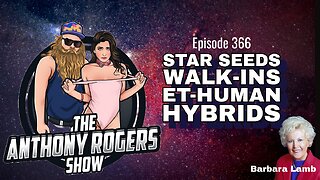 LIVE
LIVE
Anthony Rogers
10 hours agoEpisode 366 - Starseeds, Walk-ins, and ET-Human Hybrids
136 watching -
 LIVE
LIVE
AlaskanBallistics
2 hours agoI Love this Gun Podcast #34
99 watching -
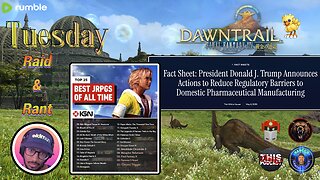 LIVE
LIVE
FusedAegisTV
5 hours ago『NIN lvl 53』Tues R&R | Final Fantasy XIV | Trump lashes out at Big Pharma, IGN top 25 JRPG list
159 watching -
 LIVE
LIVE
Adam Does Movies
8 hours agoTuesday Movie Talk Hangout + AMA - LIVE!
101 watching -
 1:34:28
1:34:28
Glenn Greenwald
4 hours agoJake Tapper Pretends He Didn't Know About Biden's Decline; Trump's Saudi Arabia Speech: A New Foreign Policy? | SYSTEM UPDATE #454
203K30 -
 12:45
12:45
Deskofpompliano
5 hours ago $6.51 earnedBitcoin And Crypto’s Takeover Of Wall Street Is Just Beginning | From The Desk Of Anthony Pompliano
32.1K5 -
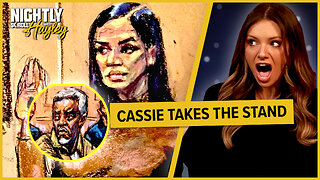 1:06:56
1:06:56
BonginoReport
6 hours agoDiddy Trial Exposes Demonic Entertainment Industry - Nightly Scroll with Hayley Caronia (Ep. 47)
221K81 -
 1:23:36
1:23:36
Kim Iversen
5 hours agoTrump DITCHES Netanyahu! Is Israel Losing Its Grip on America?
231K143 -
 3:33:15
3:33:15
Michael Franzese
5 hours agoElizabeth Pipko: Young, Fearless, and Fighting for Freedom
72.2K7 -
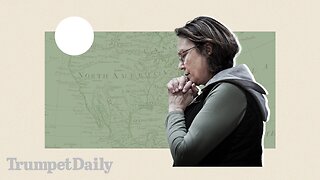 54:54
54:54
LFA TV
11 hours agoAmerica’s Religious Resurgence | TRUMPET DAILY 5.13.25 7PM
40.3K2
